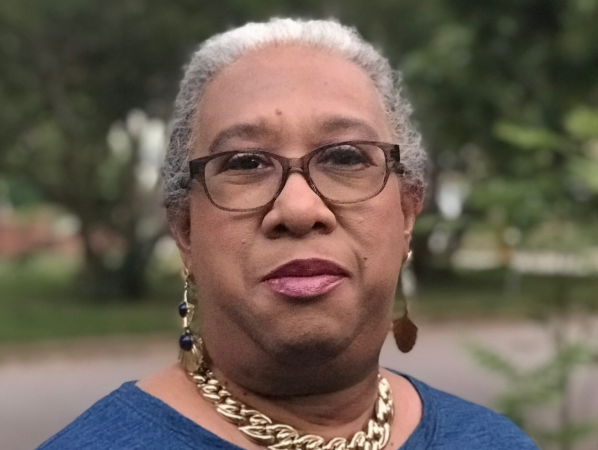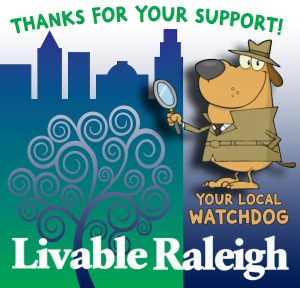
Carmen Cauthen is a lifelong activist for racial justice and a servant-leader in the African-American community in Raleigh. Her roots in the community go deep and wide. Her work with children and parents, always as a volunteer, spans her entire adult life. She’s been a missionary—a quiet, determined force—in a multitude of faith-based, school and community projects to advance racial equality. She was the founder of the NAACP chapter at N.C. State University. As co-founder of the Wake Housing Justice Coalition, she’s helped change the conversation about affordable housing in Raleigh to focus it on helping those in the greatest need.
I follow a listserv to see what people are saying about building, growth and change on the New Bern Avenue corridor since that is where I live. The latest conversation is about the city purchasing the DMV building at more than the appraised price.
If I talk about the evils of putting more unaffordable housing in the community, I am called a NIMBY (not in my back yard). They never seem to understand that I am not advocating for the haves, but for the have nots. If you have no back yard – that is who I am fighting for. I could be one of them.
Here is what I just posted because they pissed me off talking about how long it will take for the city to do something and they should just sell to a developer. (I mean these people even complained about the elder housing at Milner Memorial Church at Longview because it wasn’t going to be a large high rise. They literally talked about people grandparents – dragging them for filth as my daughter says.)
“Sometimes watching this listserv is amazing. I think that the question that I want to ask is where do you want the people who are now living in the new one bedroom apartments up and down the outer corridors in and out of the city to live? In case you don’t know what I am talking about, it is the hotels that are overrun by people who are moving here “for a better life” or those who have suddenly lost the housing that they had (probably in the surrounding neighborhoods) who had been renting because that is all that they could afford until their landlords (who didn’t keep up the property) sold out to high bids for new housing that many of you in the past have told me is what was needed for supply and demand and would then create the affordable housing that is desperately needed in Raleigh and across the country.
“We can’t all live in “luxury apartments.” Opportunity Zones were not created just for people with money and higher wage salaries. I retired on what I thought was a decent salary after working for the Legislature for over 25 years. Literally can’t afford apartment rent today and definitely can’t afford to purchase a home (even after selling the one that I now own) and I am a 63 year native of Raleigh.
“This is not about “not in my back yard” or ‘yes in my back yard”. This is about all of us who live in Raleigh (all of the humans) needing decent housing at prices that our jobs/careers/businesses can afford. Bus Rapid Transit is not being created for those who have been living here because the bus system was originally created to take Black maids from SE Raleigh to the homes of the white people in North Raleigh or ITB (Inside The Beltline) to clean. The routes haven’t changed much. The routes being planned now will not help those who can’t afford decent cars now nor will they help those living in the apartment/hotels. They won’t help those who are living out Rock Quarry Road where apartment homes are shooting up rapidly in what used to be woodland.
“Affordable housing for those making 80% AMI (average median income) is for those with salaries around $75,000 which is what I retired at in 2011 and my retirement income is 3/4 of that before health insurance ($700/month) comes out. The elders who retired 20 years before me may have their houses paid off, but their other expenses continue to climb – especially their property taxes and it is definitely a stretch for many of them who also have health issues due to aging and health needs.
“Many of these folk had to save for years to purchase homes and were only able to purchase in SE Raleigh because of covenants that restricted allowing Blacks in neighborhoods all over Raleigh. The land that was platted in SE Raleigh – particularly that in today’s most desirable neighborhoods – was platted where Freedman’s villages were located and the plats were generally tiny so that formerly enslaved people could be leased tiny houses by white real estate investors who were making money hand over fist on properties that were 1/10 the size of what they were willing to live on. Poor whites also lived in these same areas but were not held back from moving out as they made more money.
“The issues we face with housing here in Raleigh and elsewhere have much more to do with the systems of housing that were set up almost 200 years ago and that is why you see many of the things in these neighborhoods today. Some of this also occurred because of Urban renewal which occurred all over Raleigh – pushing out those families least able to fight back because they had no political or economic power. The Smoky Hollow of today housed over 160 families in the 1940s until they were pushed out to create Capital Boulevard. Oberlin Village was cut in half by what was a one lane Wade Avenue (which wiped out the 4 block radius of families in the San Domingo section) to create part of the highway system in the 1950s. 4th Ward was wiped out in order to build the Dawson – McDowell connector (planned in 1950s and put into place between 1965-1975) and those families, churches and businesses also had to scatter – several hundred – out to the Biltmore Hills/Rock Quarry Road/Southgate area to accommodate that.
“Know what you desire to see ends up being built on the backs of Black and poor people who bear the brunt of losing places to live so that those with money can have what they want. And be consistent in what you want to see in YOUR backyard. Be thankful that none of the people who get pushed out are your family members and friends – or your businesses or ways that you make your livelihood.”
Guess I’ll get dragged now – but sometimes you just have to let the truth be told.
Carmen Cauthen
If you appreciate the kind of reporting we bring to you
|
Please donate $10 or $20, Thanks for supporting |
 |

